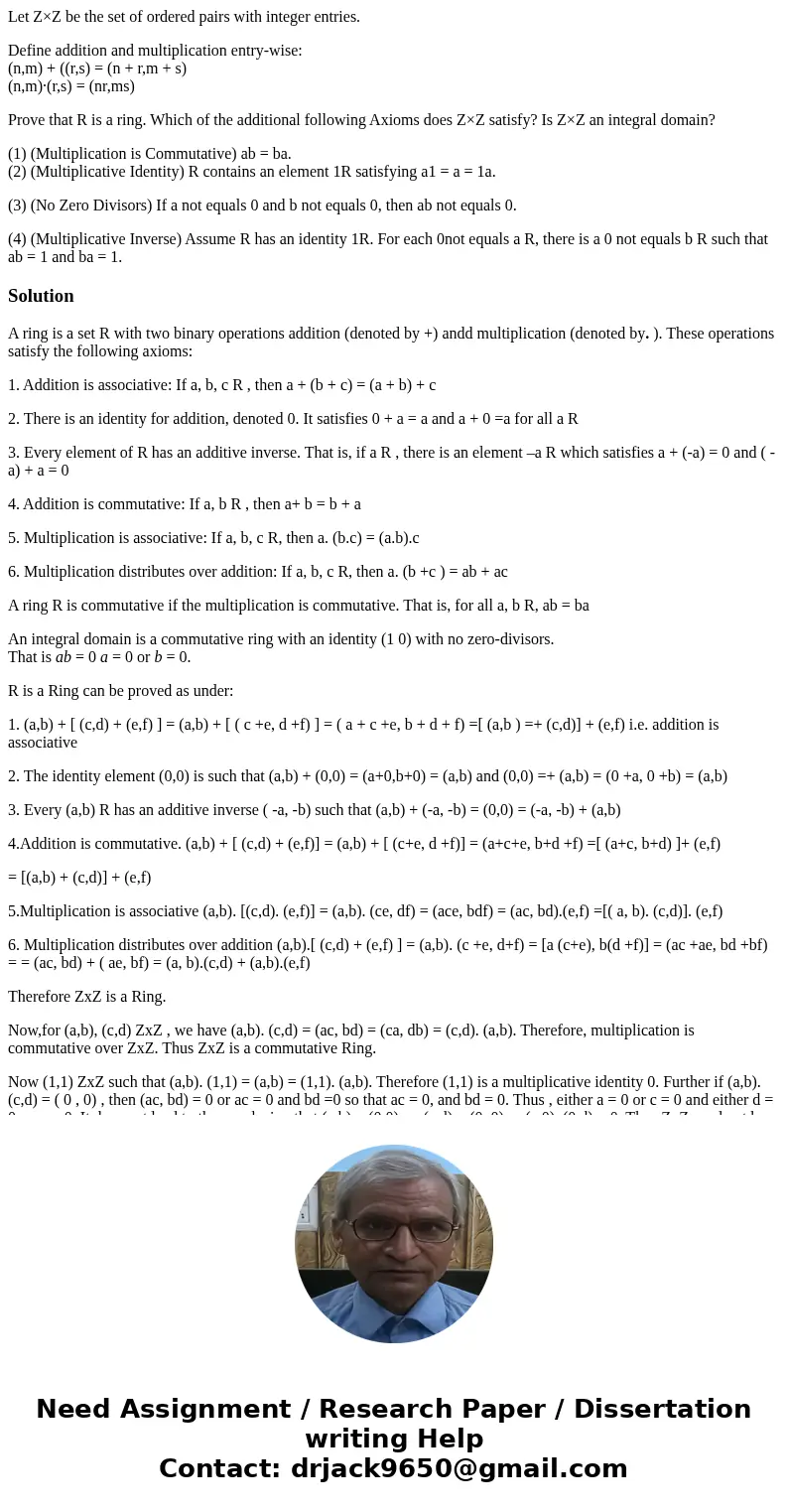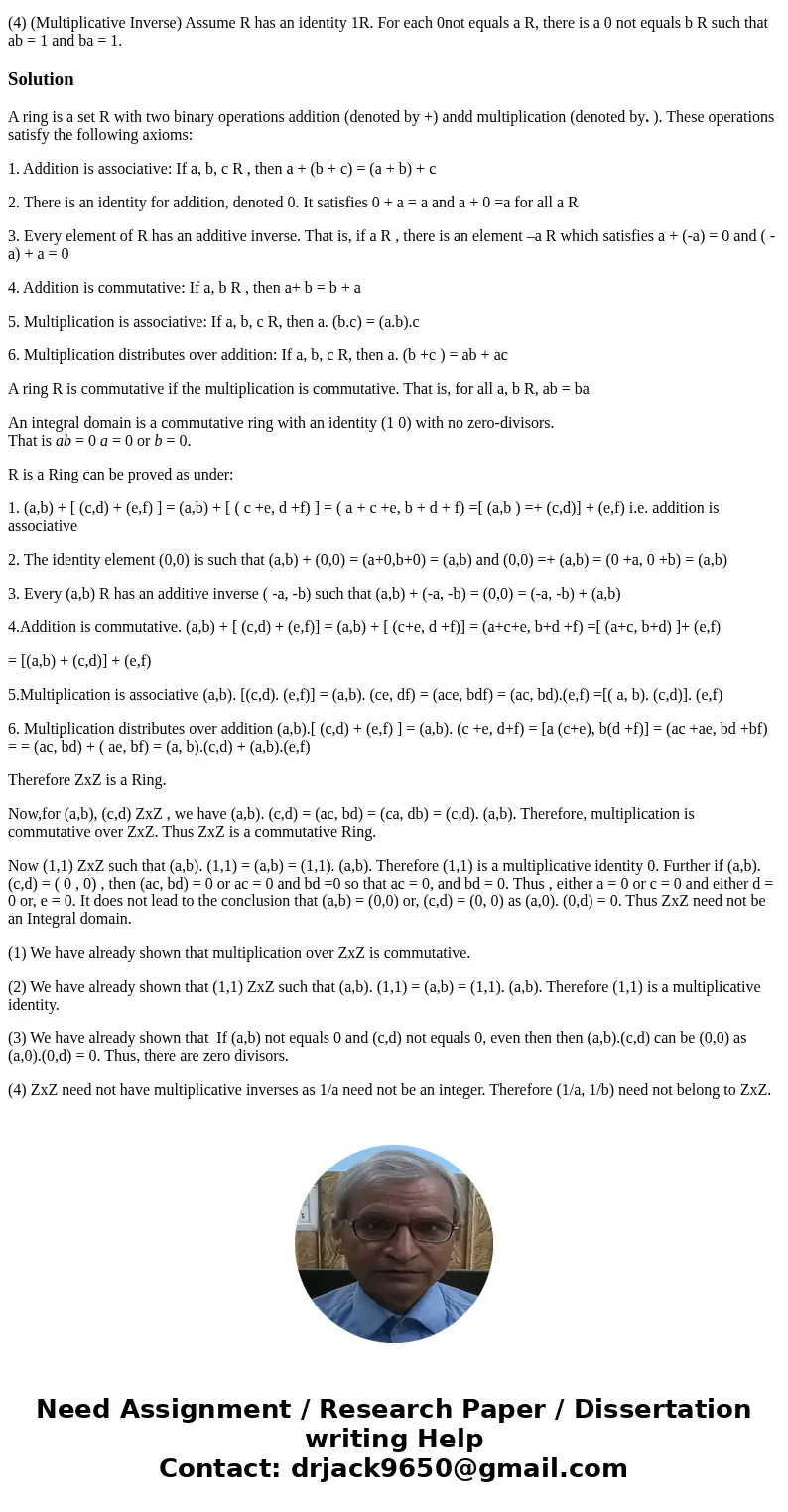Let ZZ be the set of ordered pairs with integer entries Defi
Let Z×Z be the set of ordered pairs with integer entries.
Define addition and multiplication entry-wise:
(n,m) + ((r,s) = (n + r,m + s)
(n,m)·(r,s) = (nr,ms)
Prove that R is a ring. Which of the additional following Axioms does Z×Z satisfy? Is Z×Z an integral domain?
(1) (Multiplication is Commutative) ab = ba.
(2) (Multiplicative Identity) R contains an element 1R satisfying a1 = a = 1a.
(3) (No Zero Divisors) If a not equals 0 and b not equals 0, then ab not equals 0.
(4) (Multiplicative Inverse) Assume R has an identity 1R. For each 0not equals a R, there is a 0 not equals b R such that ab = 1 and ba = 1.
Solution
A ring is a set R with two binary operations addition (denoted by +) andd multiplication (denoted by. ). These operations satisfy the following axioms:
1. Addition is associative: If a, b, c R , then a + (b + c) = (a + b) + c
2. There is an identity for addition, denoted 0. It satisfies 0 + a = a and a + 0 =a for all a R
3. Every element of R has an additive inverse. That is, if a R , there is an element –a R which satisfies a + (-a) = 0 and ( -a) + a = 0
4. Addition is commutative: If a, b R , then a+ b = b + a
5. Multiplication is associative: If a, b, c R, then a. (b.c) = (a.b).c
6. Multiplication distributes over addition: If a, b, c R, then a. (b +c ) = ab + ac
A ring R is commutative if the multiplication is commutative. That is, for all a, b R, ab = ba
An integral domain is a commutative ring with an identity (1 0) with no zero-divisors.
That is ab = 0 a = 0 or b = 0.
R is a Ring can be proved as under:
1. (a,b) + [ (c,d) + (e,f) ] = (a,b) + [ ( c +e, d +f) ] = ( a + c +e, b + d + f) =[ (a,b ) =+ (c,d)] + (e,f) i.e. addition is associative
2. The identity element (0,0) is such that (a,b) + (0,0) = (a+0,b+0) = (a,b) and (0,0) =+ (a,b) = (0 +a, 0 +b) = (a,b)
3. Every (a,b) R has an additive inverse ( -a, -b) such that (a,b) + (-a, -b) = (0,0) = (-a, -b) + (a,b)
4.Addition is commutative. (a,b) + [ (c,d) + (e,f)] = (a,b) + [ (c+e, d +f)] = (a+c+e, b+d +f) =[ (a+c, b+d) ]+ (e,f)
= [(a,b) + (c,d)] + (e,f)
5.Multiplication is associative (a,b). [(c,d). (e,f)] = (a,b). (ce, df) = (ace, bdf) = (ac, bd).(e,f) =[( a, b). (c,d)]. (e,f)
6. Multiplication distributes over addition (a,b).[ (c,d) + (e,f) ] = (a,b). (c +e, d+f) = [a (c+e), b(d +f)] = (ac +ae, bd +bf) = = (ac, bd) + ( ae, bf) = (a, b).(c,d) + (a,b).(e,f)
Therefore ZxZ is a Ring.
Now,for (a,b), (c,d) ZxZ , we have (a,b). (c,d) = (ac, bd) = (ca, db) = (c,d). (a,b). Therefore, multiplication is commutative over ZxZ. Thus ZxZ is a commutative Ring.
Now (1,1) ZxZ such that (a,b). (1,1) = (a,b) = (1,1). (a,b). Therefore (1,1) is a multiplicative identity 0. Further if (a,b).(c,d) = ( 0 , 0) , then (ac, bd) = 0 or ac = 0 and bd =0 so that ac = 0, and bd = 0. Thus , either a = 0 or c = 0 and either d = 0 or, e = 0. It does not lead to the conclusion that (a,b) = (0,0) or, (c,d) = (0, 0) as (a,0). (0,d) = 0. Thus ZxZ need not be an Integral domain.
(1) We have already shown that multiplication over ZxZ is commutative.
(2) We have already shown that (1,1) ZxZ such that (a,b). (1,1) = (a,b) = (1,1). (a,b). Therefore (1,1) is a multiplicative identity.
(3) We have already shown that If (a,b) not equals 0 and (c,d) not equals 0, even then then (a,b).(c,d) can be (0,0) as (a,0).(0,d) = 0. Thus, there are zero divisors.
(4) ZxZ need not have multiplicative inverses as 1/a need not be an integer. Therefore (1/a, 1/b) need not belong to ZxZ.


 Homework Sourse
Homework Sourse